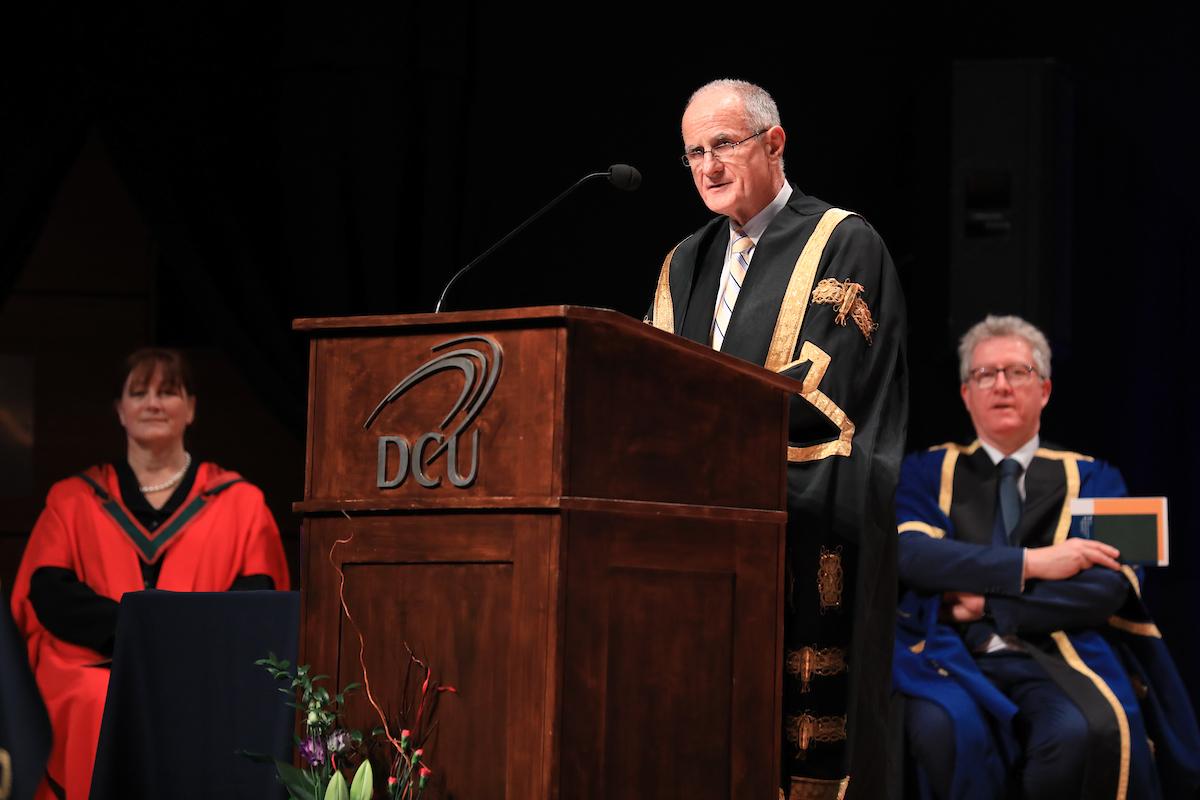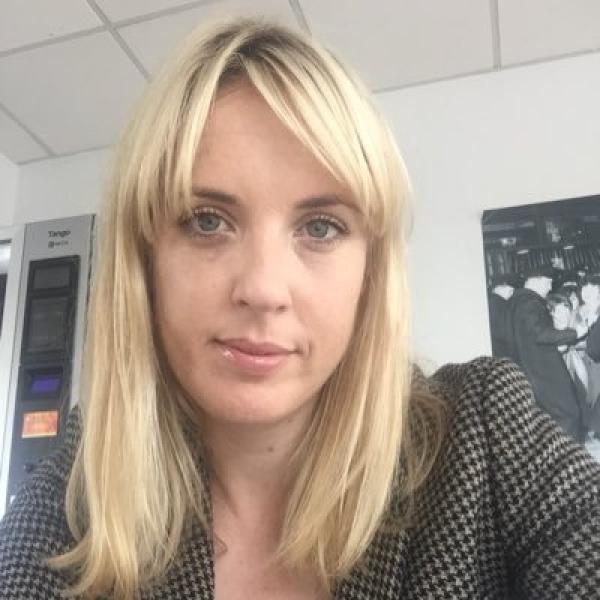

'DCU is a young university that has come of age'
Accountant, dentist, presidential spouse who built bridges with communities in Northern Ireland, a Senator, joint patron of the ‘30% Club’, Chancellor of DCU... Judging by his track record, now that Dr Martin McAleese finished his second term as Chancellor of this university earlier this year, you can rest assured he won’t be idle.
As Chancellor, Dr McAleese has spent 10 years heading up DCU’s governing authority through a decade of unprecedented change and growth for the university. Prior to becoming Chancellor, the Queen’s University Belfast and Trinity College alumnus with numerous honorary doctorates, including one from DCU, enjoyed successful careers in accountancy and dentistry, before moving to Áras an Uachtaráin when his wife, Mary, became President.
He became renowned and widely praised for his engagements with communities and projects supporting the Good Friday Agreement.
Now living in Cootehall, Co Roscommon, the couple have spent much of their time in lockdown lending online support to many different endeavours. Their three children - Emma and twins Justin and Sara-Mai - all live in Dublin, as well as their much adored grandsons.
Martin became Chancellor in 2011 and it was his time in the Áras that sowed the seeds for his relationship with DCU. “It was a bolt out of the blue,” laughs Martin when asked how the approach was made.
“When Mary was President, we would have been at different events in all the universities. DCU then awarded Mary and myself with honorary degrees at the same ceremony and that was a very special event. It put DCU into a special place in my heart.
“And then I did a couple of events with DCU Business School, during the latter stages of Mary’s
presidency."
“I was quite taken by the offer from former DCU President Brian MacCraith to become Chancellor. It was a huge honour,” he says.
In 2015, Dr McAleese was asked if he was prepared to serve a second term as chancellor. “By that stage, the incorporation project was almost four years in the making,” he recalls, adding that many people were cynical about whether incorporation could ever happen.
But DCU stuck to it - the four colleges stuck together and made it happen.” There is little doubt that Dr McAleese’s pre-existing relationships with Archbishop Diarmuid Martin and Archbishop Michael Jackson helped with this process.
Dr McAleese chaired strategic meetings for the project, involving both archbishops, the then DCU
President Brian MacCraith, and Dáire Keogh, who was President of St Patrick’s College.
In a move that heralded a new era in Irish education, St Patrick’s College in Drumcondra, the Church of Ireland College of Education (CICE) and the Mater Dei Institute of Education came together as the Institute of Education, a new faculty in DCU. This saw trainee teachers from the Protestant and Catholic traditions educated together for the first time on the island of Ireland.
“The incorporation project brought in six academic schools, 11 new research centres, and two denominational centres, but the important thing in all of this is that it puts young people and teacher formation into - for the first time I think - a university environment. “In that environment they are exposed to leading edge, up-to-date research and technology. What that means is you end up with a much more rounded teacher to be put in the service of our children,” he says.
Another reason for staying on was the process of selecting a new President for DCU. This began in earnest in early 2018. “That was a long process that eventually resulted in the appointment of Dáire Keogh as President and I think we made an absolutely fabulous choice too,” he says.
Looking back over his decade as Chancellor, Dr McAleese has a number of highlights. Among them are the 2013 honorary conferrings - on the 15th anniversary of the Good Friday Agreement - of the late Seamus Mallon, David Trimble and former US Senator George Mitchell.
“Seamus Mallon and David Trimble, the two principal architects of the Good Friday Agreement, and from two communities that were estranged for so long. These two men put peace above everything.
They took the risks and they delivered. Senator George Mitchell gave up five years of his life for Ireland. “The Good Friday Agreement remains a real cause for celebration, a cause for hope. It is a roadmap to peace, it’s a work in progress.”
In 2017, DCU honoured former US President Bill Clinton.“This man turned out to be quite a friend of Ireland, who made the cause of peace his personal crusade,” says Dr McAleese.
There is much for Dr McAleese to be proud about when it comes to the university. He pays special mention to the university’s Access programme, its designation as a ‘University of Sanctuary’, DCU’s Age Friendly initiative (the first of its kind in the world) and DCU becoming the world’s first Autism Friendly University.
However, he is most proud of what DCU’s graduates have achieved. In early 2018, under Dr McAleese’s leadership, the Governing Authority of which he is Chair, held every second meeting in
the premises of a major employer of DCU graduates.
This gave authority members the opportunity to meet with senior partners or managing directors, who would tell them of their experiences working with DCU graduates.
DCU is a “young university that has come of age with a good story to tell,” says Dr McAleese.
“Why is that? Fundamentally, it is the quality of our graduates who take the good name of DCU wherever they go.”
Mindful that the majority of recent graduates have started their working lives ‘virtually’, what advice would he give if he was delivering a final ‘in-person’ graduation address in the Helix?
“Every generation has its mountain to climb. This particular Covid mountain affects everyone. But, broadly speaking, it will pass, as have all sorts of challenges and crises in the past.”
“Every generation has its mountain to climb. This particular Covid mountain affects everyone. But, broadly speaking, it will pass, as have all sorts of challenges and rises in the past.”
Speaking of Covid, Dr McAleese fears it may pause any progress made in the area of gender equality. “Working parents are at home with their children, and what I’m hearing anecdotally - and I can understand this - an unfair portion of the burden of running the house falls on the mother, on the female. And that’s just the reality of it.
“I worry about that because when you think of it we move from this into the new reality and you can see that if you have a blended approach to the workplace - where you have two or three days at home, and the rest in the office - those days at home I think will possibly continue with the unfair portion of the burden of running the house falling on the mother.
“I worry also about the fact that if you are away from the workplace... that absence from the workplace may very well jeopardise their promotional prospects. They’re ‘out of the loop’ for those two days and the ‘loop’ is where those decisions are made. We just need to be very, very careful,” he says.
As he bid farewell to DCU, Dr McAleese says the university has left a lasting impression. “DCU has left an imprint on me - it has been a real privilege. I have some lovely memories, and I have
met the most impressive people,” he says.
So what’s he going to do next? “Whatever it is, it will be entirely different. Learn a language maybe.”

Jane Last (BA
Journalism, 2002)
Head of Digital
Communications
at DCU
@JaneLast
